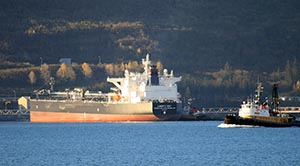
By AUSTIN LOVE
Council Project Manager
A new council study found that the low-sulfur fuel used in oil tankers has resulted in far less air pollution from crude oil tankers than just a few years ago.
The study, by Starcrest Consulting Group, evaluated the air pollution from tankers that traveled through Prince William Sound during 2014. The study looked at three air pollutants: nitrogen oxides, particulate matter, and sulfur oxides. These pollutants are produced by internal combustion engines and released in a vessel’s exhaust. Each of the pollutants can have negative impacts on human health, contributing to heart and lung disease. Researchers calculated the amount of each of these pollutants that would have been released if the tankers had been using fuel with a sulfur content of 2.7, 1.0, or 0.1 percent. The results were then compared to determine the amount reduced.


